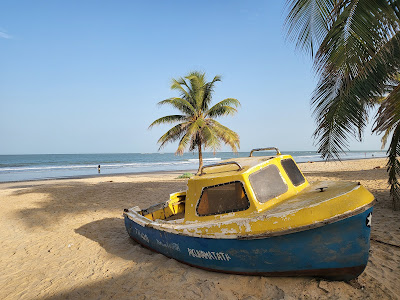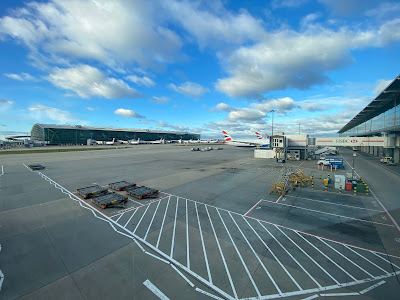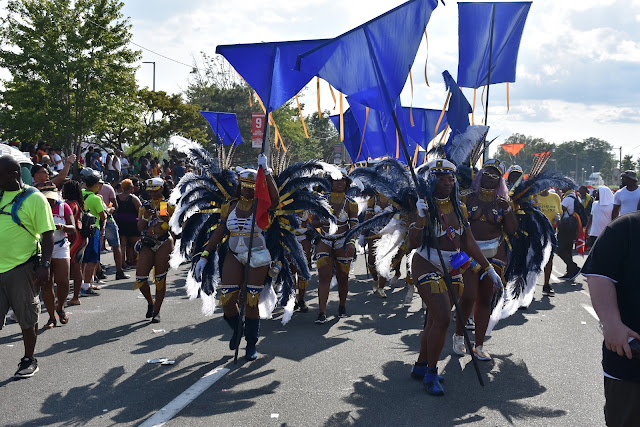Gambia: The Smiling Coast of Africa.
"Welcome to the Gambia, the
smiling coast of Africa...!" yelled the tour guide on the bus on our way to
the hotel from the airport as he gave everyone a quick introduction to his
country. At this point, I was already exhausted having queued for almost 2
hours just to get into the country. The immigration procedure at the airport was unnecessarily tedious. On arrival, all passengers were directed to a
small hall where the queuing started. The first queue was to pay 20 USD (or £20 or
€20) "security fee" in cash. This was mandatory for all arriving
passengers regardless of nationality. After payment, one then had to join the next
queue to have one's passport stamped. The process was slow and annoying but the Immigration Officers were nice and friendly.
The trip to the hotel was uneventful and there wasn't much to see as it was already past sunset. I listened as the tour guide spoke about the history and culture of the country. The
As usual, I was definitely not going to sequester in the hotel just lounging by the
poolside so I set out to discover the country. The first stop
was the stretch of beaches on the west coast of the island, near Serrekunda. I found them to be
quite clean and perfect for a jog early in the morning however they become quite crowded in the evenings as the locals come out to socialise.
Banjul, the island capital.
As most of the hotels are situated near the West coast, most visitors to the country will probably never get to visit Banjul, the densely-populated capital of the Gambia. The city of Banjul is situated on a small island in the North West of the Gambia and it is linked to the south of the country by a bridge. A ferry service connects the city to the Northern part of the country across the Gambia river. While it was much less touristy than the coastal towns, Banjul had a unique charm that I found quite appealing as it reminded me of Lagos Island.
At the entrance to the city is a gigantic monument, Arch 22. Apparently, this was constructed to commemorate the date of a military coup! A short walk around the city with a visit to the bustling Albert market offers an opportunity to experience urban living Gambian style. The white sand beach in Banjul was also quite clean and young locals could be seen jogging or playing football in the evenings. I found a fairly grand hotel by the beach which, I presumed from the architecture, would have been built in the colonial era but save for a handful of international visitors, the place felt quite neglected.
Serrekunda.
Given the presence of more social and entertainment venues, many visitors may prefer to stay around Serrekunda which is the country's largest city. For everything entertainment, the place to be is Senegambia! This small strip is packed full of bars, restaurants, shopping centres and hotels. Many bars even have live music performances every night. Beware of individuals trying to sell wares to you. By all means, purchase items from them if you fancy (they are just trying to make a living) otherwise, a firm "no thanks" would send them on their way.
The people.
The most amazing thing about the Gambians I interacted with was their friendliness. Everyone was keen to help and unlike many other African countries, they didn't seem to treat Nigerians with suspicion! I found this quite impressive. I also found the peaceful coexistence of Gambians of all faiths remarkable. Despite the country being over 90% Muslim, Christian holidays are celebrated by many Gambians. Everyone thronged the beaches on New Year's eve and there were colourful fireworks at midnight on New Year's day.
Paradise Beach, Gambia's best kept secret!
Paradise beach (Sanyang beach), located a few kilometres south of Tanji fishing village, is a remote stunning beach with its own local community. You will also have an opportunity to explore a nearby freshwater creek, ideal for bird watching. Come here to get away from the bustle and chill at one of the numerous beach bars. There are also a handful of eco-resorts around paradise beach if you prefer to stay off-grid. Many tour guides offer to take visitors to the beach but it can be accessed independently like I did. However, my navigation app directed me to a bush path which was not motorable. In the end, I had to rely on the friendly locals to direct me to the right route. Also note that the access road is unpaved so expect a bumpy ride but trust me, the visit will be worth the hassle!
Must do:
-Gambian cuisine: Try out the delicious traditional Gambian dishes; Fish Yassa and Benachin are highly recommended.
-Craft markets: buy wood carvings
and sand paintings which Gambia is renowned for.
 -Kachikally crocodile pond: A sacred pool with dozens of crocodiles. You could come up close and personal and even take a selfie with some crocs! Don't miss the small museum within the complex to learn about the history of the Gambia.
-Kachikally crocodile pond: A sacred pool with dozens of crocodiles. You could come up close and personal and even take a selfie with some crocs! Don't miss the small museum within the complex to learn about the history of the Gambia.
Overall...
I totally enjoyed my trip to the Gambia and I was amazed by the friendliness of the people. The food was amazing and I will definitely be back.
For your departure at the airport, you will require another security fee but note that it is 1000 Dalasis or 20 USD (£20/€20). Given the exchange rate, it is advisable to pay in Dalasis so don't spend all your local currency before you arrive at the airport.








Comments
Post a Comment